It’s illegal to sell tobacco and vape products to minors. Many KY stores do it anyway
One evening last February, a teenage girl walked into the brightly lit Popular Smoke and Vape store on Lexington’s Euclid Avenue and paid $22 for a strawberry-flavored Mr. Fog Switch disposable vape device.
She shouldn’t have been able to do that.
To curb youth smoking, where Kentucky long has suffered some of the nation’s worst numbers, the minimum legal age to buy tobacco and vape products in the United States is 21. Retailers are required to check government-issued photo identification for anyone who looks younger than 27.
But the store clerk that evening didn’t ask the girl her age or look at her driver’s license, according to state records.
There are state records about the purchase because the girl — unfortunately for Popular Smoke and Vape — was one of more than 100 under-aged investigative aides employed by the Kentucky Department of Alcoholic Beverage Control, or the ABC, the agency that is supposed to enforce the ban on the sale of smoking products to minors.
The ABC sends its undercover aides, ages 16 to 20, into stores to buy cigarettes, cigars, chewing tobacco and vape products, with an adult supervisor discreetly standing nearby. The aides can’t lie about their age. Nor can they wear facial hair, heavy makeup or clothes that might make them appear older.
The ABC conducts sting operations several hundred times a year to execute state tobacco law protecting minors, and several thousand times a year on contract for the U.S. Food and Drug Administration, or the FDA, to administer federal tobacco law with a very similar goal.
Kentucky retailers flunked these tests 883 times between November 2021 and August 2023, according to a Herald-Leader analysis of ABC citations.
The citations were dominated by gas stations and convenience stores, but minors also bought smoking products at liquor stores, discount tobacco stores, vape shops, neighborhood groceries, and regional and national retail chains.
The Cardinal Country Store regional chain of Eastern Kentucky convenience stores received three warning letters and five civil fines, sometimes for repeat offenses at the same outlet.
Earlier this year, the FDA hit the Cardinal Country Store in Wheelwright, southwest of Pikeville, with a $6,397 fine for its fifth violation in 36 months after it sold VUSE Originals Golden Tobacco e-liquid to a minor without verifying their age, according to the FDA citation.
Management of Cardinal Country Store did not respond to phone calls or email seeking comment.
Dollar General stores collected 39 citations, including two on the same day — July 12, 2022 — at the other end of the state, in Hardin and Paducah.
The Dollar General clerk in Paducah told the undercover ABC aide who wanted VELO nicotine pouches “to flash something in front of the camera so it looked as if an ID was being shown, and completed the sale without an ID,” the ABC wrote in its report on the sale.
Asked for a response, Goodlettsville, Tenn.-based Dollar General told the Herald-Leader: “We have policies in place regarding the lawful purchase of tobacco and vaping products from our stores, and we expect employees to adhere to those procedures during the sale of any such item.”
Health advocates say it’s common knowledge that Kentucky youths have little difficulty buying these highly addictive products.
“One student stood with me in the halls in Frankfort and shared with a legislator that the shop near their school actually gives discounts to middle and high school students,” said Shannon Baker, director of advocacy for the American Lung Association in Kentucky and Tennessee.
Hard to stop repeat offenders
Many stores repeatedly flunk the ABC’s undercover purchase tests.
During the 21 months from November 2021 to August 2023, the ABC cited at least 114 retailers two or more times for selling smoking products to minors, according to the Herald-Leader’s analysis.
Among the repeat offenders was the Popular Smoke and Vape store on Lexington’s Euclid Avenue. It failed three inspections between September 2022 and last May. Also, each of the company’s four stores around Louisville racked up one or two violations during the same 21-month period.
What were the penalties for Popular Smoke and Vape? Usually warning letters. In some cases, civil fines that escalated up to $1,000.
The man identified in state business filings as president and registered agent of Popular Smoke and Vape, Karampal Singh, did not respond to multiple requests for comment left at the stores by the Herald-Leader.
Scofflaw tobacco and vape retailers can’t be shut down by the state because — unlike alcohol retailers, who also are forbidden to sell to minors — they’re not licensed by the state. The ABC has nothing to take away from them.
Officials with the ABC declined repeated requests to be interviewed for this story.
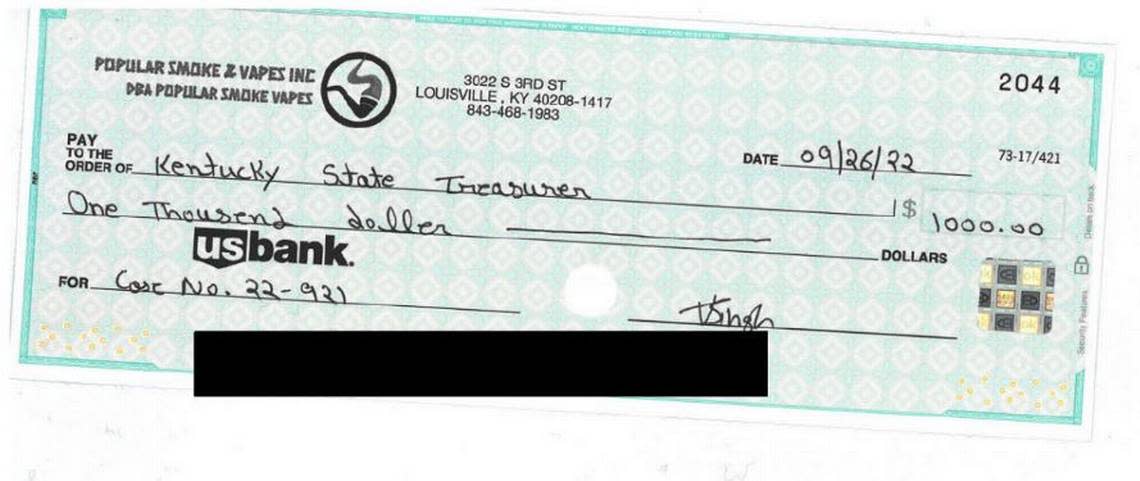
In a written statement to the Herald-Leader, the ABC said a licensed alcohol retailer that gets repeated tobacco sales violations could be charged with the offense of “disorderly premises,” placing their alcohol license at risk for suspension or revocation.
That could cost a gas station or convenience store a great deal of money. But the ABC has not done this so far, the agency said.
Kentucky lawmakers in the past have tried to pass legislation dramatically increasing the fines that retailers face for selling tobacco and vape products to minors. They’ve also proposed state licensing for stores selling these products, which is common in most of the country, to give regulators more control over stores’ location and behavior.
But those bills have been defeated in tobacco-friendly Frankfort.
“Kentucky’s history and culture is tied to the cultivation and processing of tobacco,” the ABC wrote in its most recent annual report on its retail inspections, calling for the legislature to pass a state licensing law.
“The role of tobacco in Kentucky’s economy, coupled with the fact that tobacco was the livelihood of many Kentucky families, has created strong norms of acceptance around tobacco that pose a significant challenge to prevention efforts,” the ABC wrote.
FDA mostly sends warning letters
The FDA has the authority under federal law to impose a “no-tobacco-sale order” that can stop sales at the most serious repeat offenders. But the FDA only has done that once in Kentucky since 2015, at a now-defunct Louisville convenience store nearly six years ago.
The order lasted 24 days.
The FDA seldom drops the hammer even when it can, according to a critical report issued in September by the inspector general of the U.S. Department of Health and Human Services.
In a survey sample of smoking products retailers that racked up five or more violations in 36 months, which is enough to trigger a no-sale order, fewer than one-third received an order, the inspector general wrote.
Instead, the most common penalty the FDA hands down to retailers is a warning letter. Even when it does issue a civil fine, they’re often smaller than they could be under the law, the inspector general wrote.
“The FDA’s failure to fully leverage its powers to address retailers’ underage sales of tobacco products has weakened efforts to curb the youth e-cigarette epidemic,” medical researchers warned in a 2022 study of FDA enforcement data at the Public Health Law Center in St. Paul, Minnesota.
Some state lawmakers preparing for the 2024 General Assembly, which begins in Frankfort on Jan. 2, say it’s past time for Kentucky to add sharper teeth to its tobacco and vape retail laws.
If the state really wants to keep these products out of minors’ hands, then it needs to give its regulators more tools, they say.
Vaping in particular has become far more common among Kentucky schoolchildren than parents want to believe, said state Rep. Killian Timoney, R-Lexington, who works in the Fayette County Public Schools.
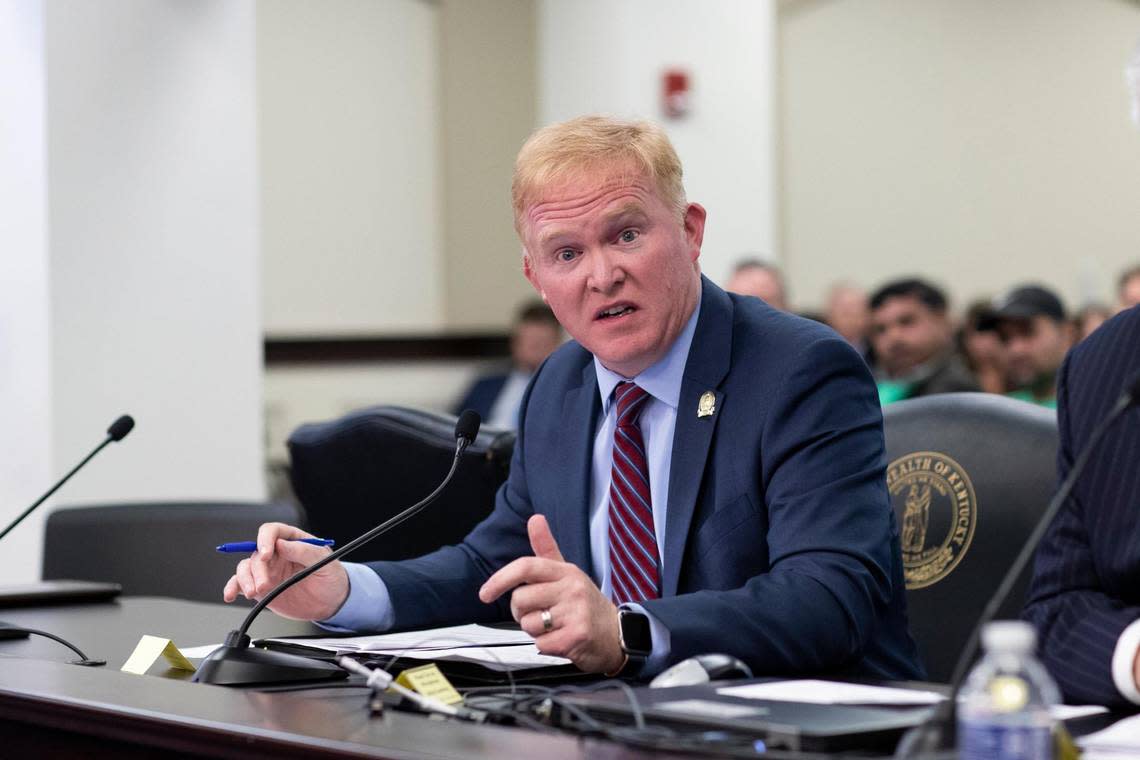
“I think there is a legislative place for us to get involved in this, both in strengthening the (regulations) and in education,” Timoney said.
Timoney said his sister-in-law once worked for the ABC. At the time, he said, she employed his future wife — then a minor — in the agency’s sting operations on smoking retailers, so he is familiar with the enforcement process.
“If licensing is being done elsewhere out there, then I think we need to be looking at that,” Timoney said.
“These people are just taking the $1,000 fines that ABC is passing out right now and saying, ‘Listen, don’t draw any attention to this, don’t make any squawk about this, because if you do, someone will run it up the flagpole and a bill will get filed,’ he said.
“I think it’s just the price of doing business for them when you deal with vices.”
Vaping more popular than cigarettes
In Kentucky, health advocates say, there’s not much to prevent kids from walking into a store and buying smoking products other than the conscience of the person behind the counter.
“I don’t think anyone believes the current deterrent system is systemic, thorough or really that much of a deterrent,” said Terry Brooks, executive director of Kentucky Youth Advocates.
His organization’s mission is promoting the well-being of Kentucky’s kids.
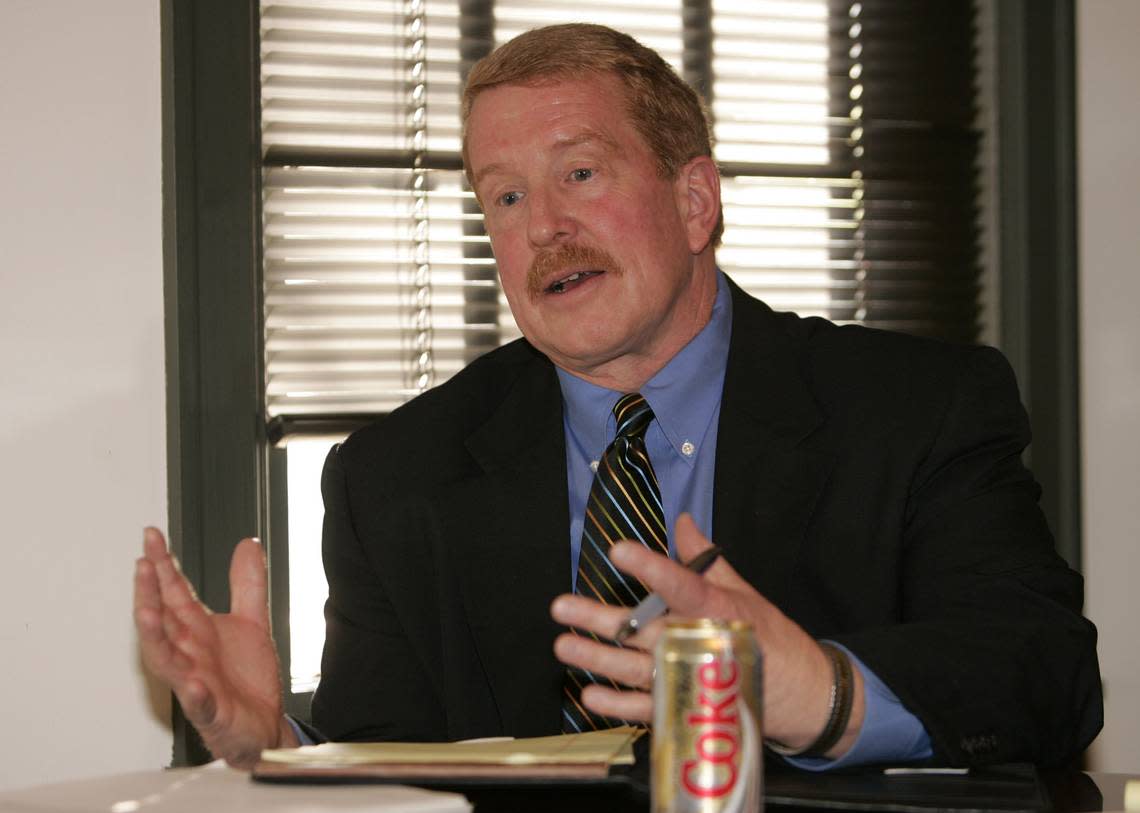
“All the evidence we’re seeing — and this includes anecdotal evidence that I hear from my two grandchildren — leads me to believe that kids don’t have any problems getting their hands on these things. And I think it’s a much more widespread phenomena than most of us realize,” Brooks said.
Concern among health groups has been shifting from traditional cigarettes to vaping with electronic “e-cigarettes.”
In a 2021 statewide health survey by the Kentucky Cabinet for Health and Family Services, 12 percent of high school seniors said they had smoked cigarettes in the past year, reflecting a steady improvement in teen smoking rates over the last decade. About 10 percent of seniors said they had used smokeless tobacco.
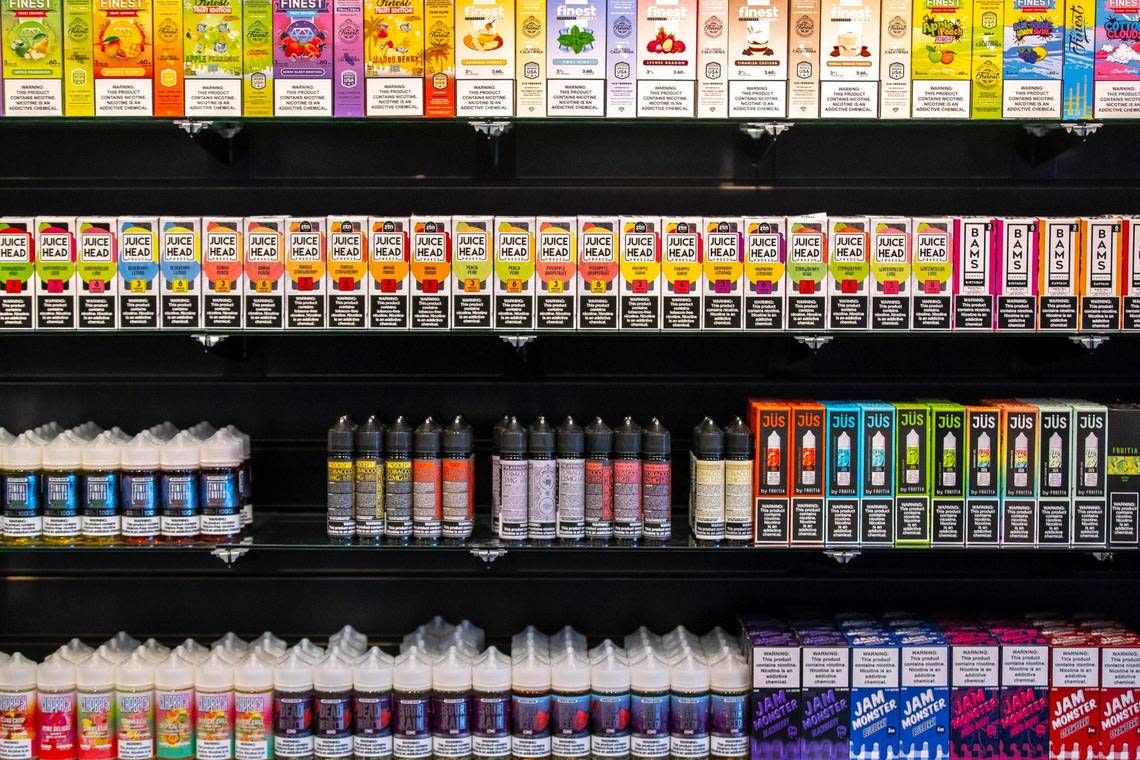
But more than one in every four high school seniors said they had vaped in the past year, despite the harmful effects of nicotine on their developing brains and the substances inhaled into their lungs from the vape aerosol. Twenty percent of 10th graders said they had vaped in the previous year, as did 13 percent of eighth graders.
“Kentucky’s prevalence of youth vaping is higher than the national average. The age that young people are trying vapes is getting younger, as 9.4 percent of Kentucky students said they first tried a vape in 6th grade,” Kentucky Youth Advocates said in an August blog post.
Although many 12th graders who vaped said they borrow the devices from a friend or arrange for an adult to buy them, about 25 percent said they make the purchases themselves at stores in their communities.
“A law against selling to kids is only as good as its enforcement. Right now, that’s not enough,” Sydney Shaffer, a Scott County high school student and American Lung Association student advocate, testified in October to the legislature’s Interim Joint Committee on Licensing, Occupations and Administrative Regulations.
“I think we all know that kids were targeted and continue to be targeted with cool advertising campaigns that we’re seeing and lured in with ... cool-looking devices, cool-sounding flavors and clever marketing,” Shaffer told lawmakers. “And they are being fed high levels of nicotine.”
Licensing shows where the stores are
This winter, health advocates and state regulators at the ABC say they will ask the General Assembly to consider a statewide licensing law. Unlike about 40 other states and a number of cities around the country, including Louisville, Kentucky doesn’t require retailers to buy a license and register.
Without licensing, nobody has a complete list of all the tobacco and vape retailers in Kentucky, so the ABC doesn’t know everywhere it needs to conduct its undercover sting operations.
The ABC makes an educated guess.
It searches Google Maps for the names and addresses of stores that say they sell tobacco products. It consults the state’s Kentucky Lottery and food stamp databases to collect the names of groceries, convenience stores and other businesses likely to sell smoking products.
Also, licensed alcohol retailers are supposed to disclose to the ABC if they sell smoking products as well.
In its annual report on its inspections of tobacco and vape retailers, the ABC called the absence of licensing “the most significant and persistent challenge ... Lack of an official list of tobacco retailers makes it difficult to maintain our accuracy rate and also hampers our ability to reach stores.”
Baker, the regional director of advocacy for the American Lung Association, said the ABC conducts thousands of retail inspections annually to catch sales to minors, but, “It’s a fraction of what we know is out in our community.”
“I live in Louisville, and here in Louisville we probably have — I say this half in jest — in excess of 400 retail outlets just within reach of my home,” she said. “We know what types of establishments sell these products, but not always where the specific establishments are. These vape shops that just pop up on the corner in Kentucky communities are not on enforcement’s radar.”
The U.S. Centers for Disease Control and Prevention, the U.S. Office of the Surgeon General and the National Academy of Medicine are among those recommending that states license all retailers of smoking products inside their borders.
Retailer: Fines are ‘insignificant’
Without a license to yank from repeat offenders, which can be the unhappy fate of scofflaw alcohol retailers who sell booze to minors, the worst the state and federal governments can do to punish smoking retailers is levy fines in the thousands of dollars.
The ABC has taken steps to strengthen penalties. Starting July 1 , 2022, acting on its own interpretation of existing state law, the ABC began to levy $1,000 fines to store owners in addition to the $100 fines it was issuing to the store clerk on duty when a violation occurred.
For federal inspections, after an initial warning letter, the FDA can punish repeat offenders within a 36-month period with fines ranging from $345 to $6,892.
That might sound like a lot until you consider the average gas station with a convenience store sold $424,755 in smoking products in the year 2017, according to a study of data from the U.S. Economic Census.
The fines are “insignificant,” said Tony Florence, president of the 723 Vapor chain of vape shops in Lexington, Nicholasville and Louisville and founding board member of the Kentucky Smoke Free Association.
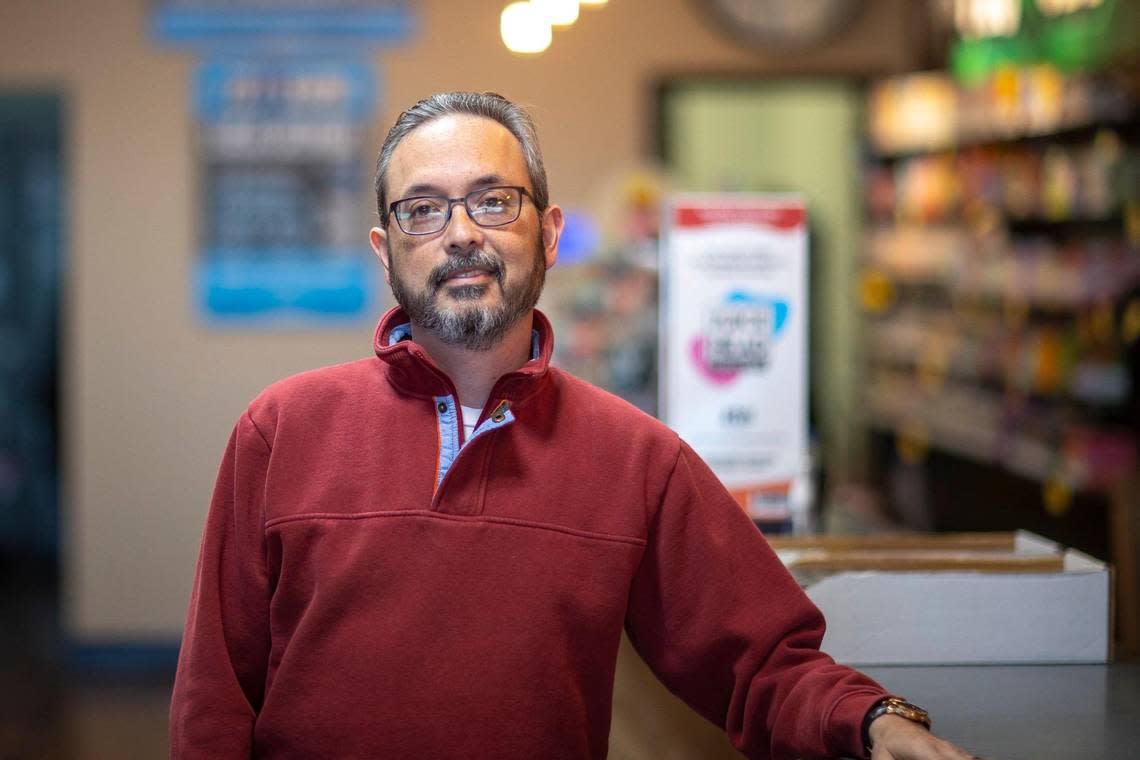
Florence is proud to point out that his business doesn’t appear on the list of sales violators in the Herald-Leader’s ABC database. Large signs are posted at his stores’ entrances, telling anyone younger than 21 to keep out.
Florence says his employees are trained to ask customers for photo identification to prove their age.
“I don’t have any patience for the places that are giving our industry a black eye,” he said.
“A lot of these stores are making tens of thousands of dollars or more a month on selling vapor products. I feel like you have to put a little sting into the financial penalties. I would have no problem whatsoever with the initial fine being in the $1,000 range and then having it scale up drastically until you lost our license and couldn’t sell anymore.”
Controlling where smoking retailers open
Finally, without licensing, the state and local governments have a hard time controlling where tobacco and vape retailers open their doors — and some are near schools and playgrounds, where kids gather, or they cluster in low-income neighborhoods.
In October, the Prestonsburg Police Department said it seized a large amount of “misbranded and questionable” vape products from a smoke shop within 1,000 feet of Prestonsburg High School.
Police said they received reports of high school students who vaped using products with THC that were obtained from the store who later suffered medical emergencies with “overdose-like symptoms.” The store repeatedly sold its products to minors while under police surveillance during a subsequent investigation, police said.

Nobody has been charged in the case, but the investigation continues, Prestonsburg police said.
Retail licensing is a “Swiss army knife” for protecting minors from smoking, because it offers so many useful options, said Kurt Ribisl, chairman of the Department of Health Behavior at the University of North Carolina’s Gillings School of Global Public Health.
“Tobacco products are the most deadly products sold in interstate commerce when used as intended. Half of its users will die from its consumption,” Ribisl said.
“So to know who is selling these products and where they are — to be able to effectively enforce the laws on who they’re selling it to — and to be able to collect at least some revenue from them in the form of licensing fees to pay for this enforcement — to me, this sounds like a complete no-brainer,” Ribisl said.
“Why wouldn’t you do it?”
New restrictions face a battle in Frankfort
At the legislature’s Interim Joint Committee on Licensing, Occupations and Administrative Regulations in October, several witnesses urged lawmakers to toughen the smoking product retail laws.
Kids as young as 9, 10 and 11 are getting their hands on vape products in Kentucky, witnesses said.
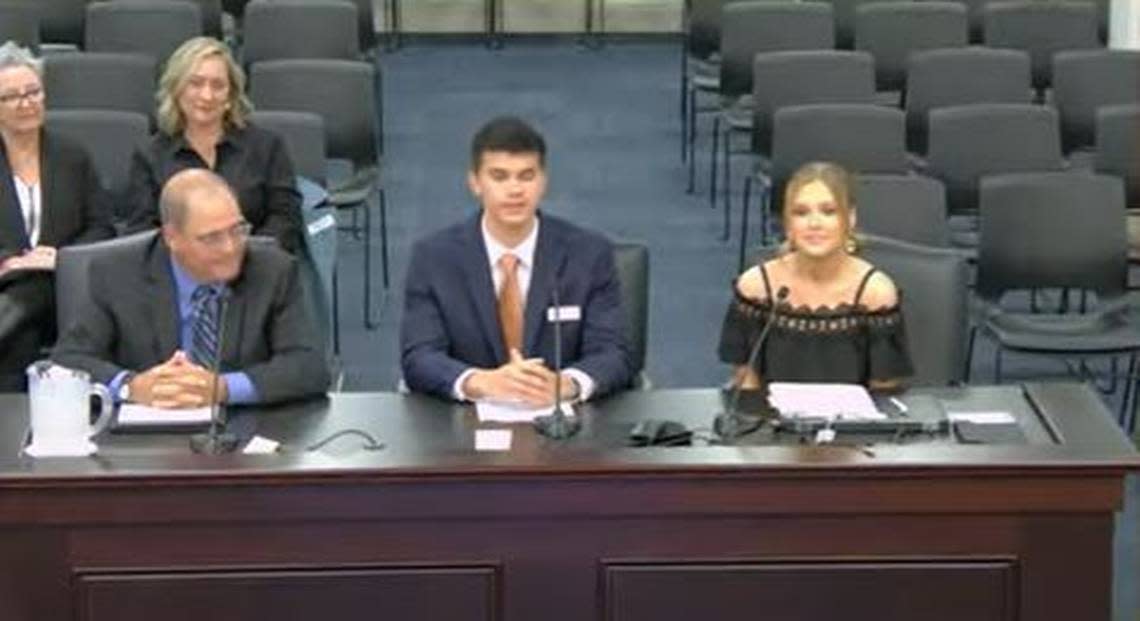
“It is our job to protect them, and thus far, we have failed,” Griffin Nemeth, youth advisory board coordinator with #iCANendthetrend, a tobacco use prevention program at the University of Kentucky, told the committee.
Dr. Tony Weaver, an internist from Morehead, told the committee that patients he’s treated for lung cancer, heart disease and emphysema started smoking when they were children, not adults. That drives home the importance of not letting people under the age of 21 get access to smoking products.
“Nobody started after age 20,” Weaver said.
“I’m pretty sure nobody in this chamber is thinking about taking up smoking or vaping or e-cigarettes for the first time. What this means is that they were addicted to the nicotine before they had the chance to make an adult decision.”
But history shows that new restrictions on tobacco and vape retailing face a battle in the General Assembly.
Last winter, for instance, state Rep. William Lawrence, R-Maysville, sponsored a bill to markedly increase the fines for retailers who sell tobacco and vape products to minors, as high as $2,000 for first offenses and as high as $3,000 for each of the subsequent offenses.
The bill didn’t even get a committee assignment. Lawrence says he’ll make another attempt this winter.
Likewise, a House bill in the 2020 session would have required the ABC to oversee the licensing of vape stores. That bill died in the face of opposition.
The vape industry has not publicly objected to state licensing. But the powerful Kentucky Retail Federation, representing thousands of different stores in communities across the state, opposes it.
“Our concern is further licensing on more and more products that become a burden on businesses and increases costs to consumers,” Steve McClain, spokesman for the Kentucky Retail Federation, told the Herald-Leader.
The chairman of the House committee that oversees licensing bills, state Rep. Matthew Koch, R-Paris, said he’s not convinced the issue of sales to minors was studied enough during the interim between legislative sessions to justify passing a retail licensing bill this upcoming session.
“I don’t see it gaining traction,” Koch said.
“Licensing and regulation is usually not an emergency. I think I’d just like to see this get more vetting before we consider a bill.”
